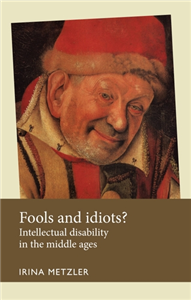Fools and idiots?
Intellectual disability in the Middle Ages
by Julie Anderson, Irina Metzler, Walton Schalick
Description
More Information
Rights Information
Afghanistan, Aland Islands, Albania, Algeria, American Samoa, Andorra, Angola, Anguilla, Antarctica, Antigua and Barbuda, Argentina, Armenia, Aruba, Australia, Austria, Azerbaijan, Bahamas, Bahrain, Bangladesh, Barbados, Belarus, Belgium, Belize, Benin, Bermuda, Bhutan, Bolivia, Bosnia and Herzegovina, Botswana, Bouvet Island, Brazil, British Indian Ocean Territory, British Virgin Islands, Brunei, Bulgaria, Burkina Faso, Burundi, Cambodia, Cameroon, Canada, Cape Verde, Cayman Islands, Central African Republic, Chad, Chile, China, Christmas Island, Cocos [Keeling] Islands, Colombia, Comoros, Congo [DRC], Congo [Republic], Cook Islands, Costa Rica, Cote d'Ivoire, Croatia, Cuba, Cyprus, Czech Republic, Denmark, Djibouti, Dominica, Dominican Republic, Ecuador, Egypt, El Salvador, Equatorial Guinea, Eritrea, Estonia, Ethiopia, Falkland Islands [Islas Malvinas], Faroe Islands, Fiji, Finland, France, French Guiana, French Polynesia, French Southern Territories, Gabon, Gambia, Georgia, Germany, Ghana, Gibraltar, Greece, Greenland, Grenada, Guadeloupe, Guam, Guatemala, Guernsey, Guinea, Guinea-Bissau, Guyana, Haiti, Heard Island and McDonald Islands, Honduras, Hong Kong, Hungary, Iceland, India, Indonesia, Iran, Iraq, Ireland, Isle of Man, Israel, Italy, Jamaica, Japan, Jersey, Jordan, Kazakhstan, Kenya, Kiribati, Kuwait, Kyrgyzstan, Laos, Latvia, Lebanon, Lesotho, Liberia, Libya, Liechtenstein, Lithuania, Luxembourg, Macau, Macedonia [FYROM], Madagascar, Malawi, Malaysia, Maldives, Mali, Malta, Marshall Islands, Martinique, Mauritania, Mauritius, Mayotte, Mexico, Micronesia, Moldova, Monaco, Mongolia, Montenegro, Montserrat, Morocco, Mozambique, Myanmar [Burma], Namibia, Nauru, Nepal, Netherlands, New Caledonia, New Zealand, Nicaragua, Niger, Nigeria, Niue, Norfolk Island, Northern Mariana Islands, North Korea, Norway, Oman, Pakistan, Palau, Palestinian Territories, Panama, Papua New Guinea, Paraguay, Peru, Philippines, Pitcairn Islands, Poland, Portugal, Puerto Rico, Qatar, Reunion, Romania, Russia, Rwanda, Saint Helena, Saint Kitts and Nevis, Saint Lucia, Saint Pierre and Miquelon, Saint Vincent and the Grenadines, Samoa, San Marino, Sao Tome and Principe, Saudi Arabia, Senegal, Serbia, Seychelles, Sierra Leone, Singapore, Slovakia, Slovenia, Solomon Islands, Somalia, South Africa, South Georgia and the South Sandwich Islands, South Korea, Spain, Sri Lanka, Sudan, Suriname, Svalbard and Jan Mayen, Swaziland, Sweden, Switzerland, Syria, Taiwan, Tajikistan, Tanzania, Thailand, Timor-Leste, Togo, Tokelau, Tonga, Trinidad and Tobago, Tunisia, Turkey, Turkmenistan, Turks and Caicos Islands, Tuvalu, U.S. Minor Outlying Islands, U.S. Virgin Islands, Uganda, Ukraine, United Arab Emirates, United Kingdom, United States, Uruguay, Uzbekistan, Vanuatu, Vatican City, Venezuela, Vietnam, Wallis and Futuna, Western Sahara, Yemen, Zambia, Zimbabwe, Bonaire, Sint Eustatius, Saba, Curaçao, Saint Barthélemy, Saint Martin, French part, Sint Maarten (Dutch Part), South Sudan
Endorsements
This is the first book devoted to the cultural history in the pre-modern period of people we now describe as having learning disabilities. Using an interdisciplinary approach, including historical semantics, medicine, natural philosophy and law, Irina Metzler considers a neglected field of social and medical history and makes an original contribution to the problem of a shifting concept such as 'idiocy'. Emphasising the issues with imposing modern definitions of what has variously been called cognitive, intellectual or mental disability onto the past, this book analyses a wide range of medieval and modern material. In order to explore how the names and words used to describe people also influenced their social and cultural treatment, this book looks at what the medieval equivalents to our modern scientific or psychiatric experts had to say about intellectual disability, and by uncovering how medieval normative texts shaped ideas of idiocy and folly, this study reconstructs what the legal and social implications of such concepts were. The book demolishes a number of historiographic myths and stereotypes surrounding intellectual disability in the Middle Ages and suggests new insights with regard to 'fools', jesters and 'idiots'. Fools and idiots? Intellectual disability in the Middle Ages will be required reading for anyone studying or working in disability studies, history of medicine, social history and the history of ideas.
Reviews
This is the first book devoted to the cultural history in the pre-modern period of people we now describe as having learning disabilities. Using an interdisciplinary approach, including historical semantics, medicine, natural philosophy and law, Irina Metzler considers a neglected field of social and medical history and makes an original contribution to the problem of a shifting concept such as 'idiocy'. Emphasising the issues with imposing modern definitions of what has variously been called cognitive, intellectual or mental disability onto the past, this book analyses a wide range of medieval and modern material. In order to explore how the names and words used to describe people also influenced their social and cultural treatment, this book looks at what the medieval equivalents to our modern scientific or psychiatric experts had to say about intellectual disability, and by uncovering how medieval normative texts shaped ideas of idiocy and folly, this study reconstructs what the legal and social implications of such concepts were. The book demolishes a number of historiographic myths and stereotypes surrounding intellectual disability in the Middle Ages and suggests new insights with regard to 'fools', jesters and 'idiots'. Fools and idiots? Intellectual disability in the Middle Ages will be required reading for anyone studying or working in disability studies, history of medicine, social history and the history of ideas.
Author Biography
Julie Anderson is a Senior Lecturer in the History Department at the University of Kent; Irina Metzler is Wellcome Trust Research Fellow in the Department of History at Swansea University;
Manchester University Press
Manchester University Press is a leading UK publisher known for excellent research in the humanities and social sciences.
View all titlesBibliographic Information
- Publisher Manchester University Press
- Publication Date February 2018
- Orginal LanguageEnglish
- ISBN/Identifier 9780719096372 / 0719096375
- Publication Country or regionUnited Kingdom
- ReadershipGeneral/trade; College/higher education; Professional and scholarly
- Publish StatusPublished
- Dimensions216 X 138 mm
- SeriesDisability History
- Reference Code4787
Manchester University Press has chosen to review this offer before it proceeds.
You will receive an email update that will bring you back to complete the process.
You can also check the status in the My Offers area

Please wait while the payment is being prepared.
Do not close this window.



